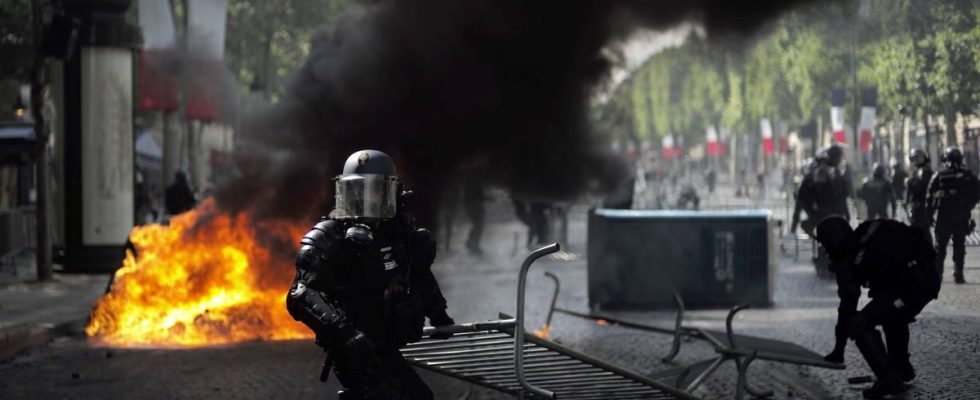It’s a bit like “tradition within tradition”, as illustrated by Sébastian Roché, research director at the CNRS and author of The Unfinished Nation. Youth facing the school and the police (Grasset). As France celebrates the storming of the Bastille, July 14 is also often the date for burnt cars and scuffles with the police.
This year, while the riots linked to the death of Nahel are still in everyone’s memory, the government is mobilizing exceptional resources with 45,000 police and gendarmes on the evening of July 13 and 14, and 130,000 members of the police in total. deployed. Because a National Day evening is not the party for everyone. As is often the day after New Year’s Eve, post July 14, there are regular counts of burned cars and clashes with the police.
A stress reliever to deceive boredom
According to Christian Mouhanna, a researcher at the CNRS and the Center for Sociological Research on Law and Penal Institutions (Cesdip), this violence, which has appeared over the past forty years, is partly explained by boredom: “The destruction is a way to let off steam, to do something, in parts of France where there is often no activity. “If there are often clashes during this moment of rejoicing, it is that in parallel with the community which celebrates, with the society which is well, there is a counter-celebration of the society of the left behind. -account which reverses the codes and makes it a moment of confrontation”, analyzes Sébastian Roché who compares the situation to the “charivari of the Middle Ages”.
On July 14, and this is something rare for a democracy, France made a show of force by parading its military arsenal. It is the state that shows its muscles. Apart from Russia or China, few countries exhibit their army in this way during a dedicated day. Would confronting the police be a way of challenging this state force? It is unlikely because “the power is in Paris and the clashes are taking place throughout France, not only in the capital”, answers Sébastian Roché. Especially since “it also happens on December 31”, recalls Christian Mouhanna. According to the researcher, a desire “unconscious or not, of rebellion on the occasion of the anniversary of a riot in which there were deaths to overthrow the regime” can however be felt.
The government “tries to reassure itself”
As for power, he wants to be firm, fearing more violent outbursts. Emmanuel Macron has, in fact, warned: “If there were some overflows, we will intervene with the greatest determination so that all of our fellow citizens can live in peace. “Every year, there are overflows, burned cars, “the authorities know that there may be damage, so they anticipate”, but there “the riots are fresh and the government fears that they will reappear, even if he is wrong,” says Sébastian Roché. “There is no stronger movement than the rest of the year because it’s July 14,” says Christian Mouhanna.
The government “tries to reassure itself and reassure the population” with a heavy police force engaged, explains Christian Mouhanna, who assures that the cancellation of the traditional speech of the President of the Republic appears as a “symptom of concern”. Not to mention the local authorities who also prefer to cancel the festivities rather than take the risk of possible material damage.
Still, clashes linked to festive moments do not respond to the same mechanism as riots. The latter “are always triggered by institutional injustices”, underlines Sébastian Roché. In 2005, it was the death of Zyed Benna and Bouna Traoré, 17 and 15 years old, following a chase with the police. This year, it is that of Nahel, 17, killed by point-blank fire during a police check.
“The government tells itself that the ashes are still hot, but the riots take place in short cycles, over a few days, and we have never seen riots rekindle twice in the same place”, explains Sébastian Roché to 20 minutes. Because now, according to our experts, the anger of these riots is consumed. “The charge is the facies checks, the brutal police checks that divert the young people of the nation from the Republic. When you are the victim of an injustice on the part of a representative of the State, you no longer have confidence in the State”, concludes Sébastian Roché. This society of the “forsaken”, the one that looks like a pressure cooker, would therefore be ready to explode on July 14 just like any other day of the year.

